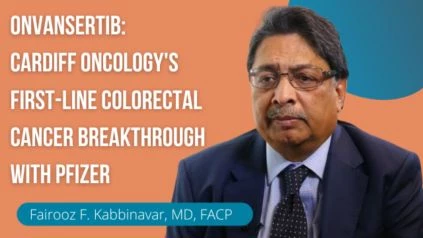By. Fairooz F. Kabbinavar, MD, FACP​
Date. 12/06/2023
Fairooz F. Kabbinavar, MD, FACP, a medical oncologist with a background in academia and drug development, began his journey at Harvard in Boston, culminating in a hematology oncology fellowship at UCLA. During his 25-year tenure at UCLA, he rose to the rank of full professor of medicine and medical oncology, receiving an endowed chair for his contributions to clinical cancer research.
Dr. Kabbinavar’s commitment to advancing cancer therapeutics, particularly in new drug development, led him to join Genentech and subsequently other biotech companies. His pivotal role in the development and approval of Avastin (Bevacizumab) for metastatic colorectal cancer marked a significant milestone in his career. This work altered the standard of care, reflecting his dedication to providing new therapies for cancer patients.
Now at Cardiff Oncology, Dr. Kabbinavar focuses on Onvansertib, an investigational drug with potential in cancer treatment. Onvansertib, an oral small molecule with a short half-life, targets PLK1 (Polo-like kinase 1), a regulator of the cell cycle expressed in tumors. The drug, administered once a day, disrupts DNA damage repair, enhances cell kill during chemotherapy, and inhibits tumor angiogenesis. In a recent discussion, Dr. Kabbinavar highlighted the challenges of treating RAS-mutated metastatic colorectal cancer, emphasizing the lack of targeted therapies for the prevalent RAS mutation. Onvansertib’s Phase 1b/2 clinical trial demonstrated outcomes, particularly in Bevacizumab-naive patients, showcasing an objective response rate and a progression-free survival. The underlying science of Onvansertib’s synergy with Bevacizumab lies in its dual inhibition of angiogenesis at different points in the HIF1 alpha pathway.
This discovery has paved the way for a shift to the frontline setting, gaining support from the FDA. Dr. Kabbinavar discussed the clinical development path, anticipating an interim readout in mid-2024 and expressing confidence in trial accrual due to the absence of competing trials. Looking beyond colorectal cancer, early data suggests Onvansertib’s efficacy in pancreatic ductal adenocarcinoma and small cell lung cancer.
Dr. Kabbinavar encourages collaboration and exploration of Onvansertib’s potential in various tumor types, emphasizing the drug’s versatility beyond colorectal cancer. In conclusion, Dr. Fairooz F. Kabbinavar’s career reflects a commitment to advancing cancer care through drug development, with Onvansertib representing an avenue for therapies in multiple cancer indications.

